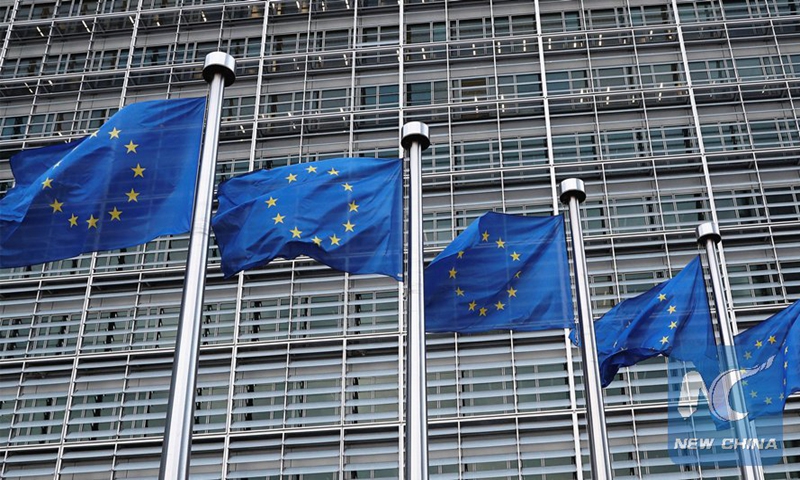
The European Union flags in front of EU headquarters in Brussels, Belgium. Photo: Xinhua
The rapid development of far-right forces, especially in the German political arena, has once again become a hot topic in Europe and beyond in recent times. Is Europe heading toward a far-right era? This question has been brought up more and more frequently lately.
Since the outbreak of international financial crises, sovereign debt crises and the refugee crisis, far-right forces have experienced a significant growth in Europe. Almost every member state of the EU has witnessed the emergence of at least one far-right organization or political party, with several of them making their way into parliaments.
In normal sense, far-right politics refers to a spectrum of political thought that tends to be radically conservative, ultra-nationalist. And in response to the rise of far-right forces, mainstream European parties have attempted to establish a so-called firewall by refusing to cooperate with these groups, barring them from government participation and engaging in public opinion suppression on them. However, this "firewall" seems to have been ineffective now.
The collapse of the "firewall" is evident in several ways. First, some far-right parties have managed to come to power in their respective countries. Second, some parties are becoming increasingly powerful, to the extent that, amid the fragmentation of party politics, mainstream parties find it increasingly difficult or even impossible to form coalitions without considering far-right parties. Third, far-right parties are becoming more mainstream while shedding their extremist image. Some of their policy proposals are even being adopted by mainstream political parties, and voters are now able to openly express their support.
France, Germany and Italy, the three largest economies in the EU, are currently witnessing the rise of far-right movements. This raises a crucial question: What are the reasons behind this?
On the one hand, far-right parties have developed stronger foundations over the years, integrating themselves into the political system and amassing larger support bases. They have also become more disciplined, organized and experienced, resulting in increased political efficacy. On the other hand, mainstream parties have failed to effectively address issues related to economic development, wealth inequality and social integration. This failure has created fertile ground for far-right parties to emerge as potential alternatives for dissatisfied voters.
The recent rapid surge of far-right influence in Europe can also be attributed to the Ukraine crisis. First, the Ukraine crisis triggered a cost-of-living crisis in Europe, leading to a significant decline in the living standards of ordinary citizens. Second, the conflict exacerbated the refugee crisis in Europe. The influx of millions of Ukrainians into Europe put pressure on locals. Moreover, the Europe's sanctions against Russia and support for Ukraine led to dissatisfaction among some portions of the electorate. All of these factors have intensified public dissatisfaction with the ruling authorities.
While the far-right parties in Europe have varying demands and policy proposals, there are clear commonalities among them. They are against the acceptance of refugees and illegal immigrants, hold skepticism toward the EU and advocate for nationalism over European integration, and they generally express sympathy toward Russia while opposing the US and NATO. These policy positions are at odds with those of mainstream parties, leading to a growing influence of far-right parties that will inevitably have far-reaching effects on European society, politics and integration.
This trend may exacerbate social divisions and ethnic conflicts in Europe, potentially triggering more protests or even acts of terrorism. Far-right ideologies are not politically taboos in Europe and are often dressed in the cloak of "defending European values," making them more palatable to certain segments of the population.
The rise of far-right parties could weaken the cohesion of the EU, constraining its future integration. As these parties come to power, participate in government and enter parliaments, they could, to a large extent, influence certain policies and operations of the EU. If more member states are governed by far-right parties, the EU's unity could undoubtedly be compromised.
Lastly, it could impact the EU's external relations. The far-right's anti-globalization stance and protectionist policies resonate with many citizens, leading to a rise in trade protectionism and strained relations with the Islamic world due to actions such as rejecting refugees or burning the Koran. Relations between Europe and both the US and Russia might also experience changes as far-right movements continue to gain traction.
The rise of far-right movements in Europe have experienced ups and downs, but the responses from mainstream parties, such as ignoring them, establishing a "firewall" against them, or even emulating their policy proposals, have proven ineffective. In the context of the Russia-Ukraine conflict and broader geopolitical shifts, factors such as stagnating or declining living standards, the influx of refugees and illegal immigrants, and others that have contributed to the rise of far-right movements are likely to persist or even worsen in the long term. From this perspective, the collapse of the "firewall" against far-right influence in Europe is inevitable, posing a significant and critical challenge that Europe must carefully consider and address in the future.
The author is a vice president of the China Institutes of Contemporary International Relations. opinion@globaltimes.com.cn

